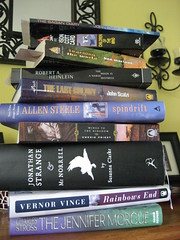 Image via Wikipedia
Image via WikipediaI bring it up because: Both the Kindle and the iPad have been described as roach motels (notably by Cory Doctorow) in the wake of the Amazon/MacMillan pricing dust-up, largely in the context of both devices wanting to "own" the digital book market and thus having no incentive to make ebook portability a priority. This, in turn, revived discussion of the larger, lingering roach motel apocalypse issue -- format obsolescence. All digital data is encoded in a specific format, and that format will eventually fall out of use, which in turn means the decoding devices will become scarce, which thus means the data will be trapped in the old format. (Raise your hand if you have old single-density floppies that your current PC can't open.) Therefore, all data formats eventually become roach motels, which is why contemporary data portability is such a pressing longterm issue.
Charles Stross took this concept to a dramatic extreme in Glasshouse, wherein the distant descendants of humanity had to reenact (inaccurately) aspects of 1950s Western culture because most of the historical records of the era were trapped in encrypted proprietary file formats. Think that's farfetched? Ask NASA how easy it is to decode digital records of the moon landing. If the world's foremost manned spaceflight agency can forget how to read its own unencrypted video tapes of events of staggering historic importance, what chance does the average consumer have of avoiding personal roach motel hell 20 years on? Maybe the Data Liberation Front are onto something after all.


![Reblog this post [with Zemanta]](http://img.zemanta.com/reblog_e.png?x-id=6452efe7-3a2a-4c1c-9002-5025f2ff5017)



![Reblog this post [with Zemanta]](http://img.zemanta.com/reblog_b.png?x-id=7d201a44-f6f2-4b3c-ae3a-0be190f0b91d)

![Reblog this post [with Zemanta]](http://img.zemanta.com/reblog_e.png?x-id=62256938-8376-4c15-b101-de994dd38b78)

![Reblog this post [with Zemanta]](http://img.zemanta.com/reblog_e.png?x-id=843e800f-64f6-4bfa-a86d-f771ee486707)